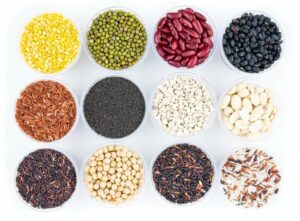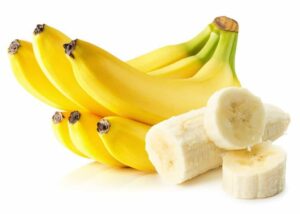4 Rules to Eat Carbs with NO Weight Gain
You’ve heard that carbs are the enemy. Nothing could be further than the truth, despite what the latest diet fads want you to believe.
Many carbohydrates do, in fact, spike your blood sugar, leading to insulin resistance and weight gain. They tend to be the ones in boxes and packages! But you can eat carbs that are wonderful fuel for a high-energy life, and remain at your ideal weight.
And in fact, you should! Carbohydrates have been the primary fuel source, of the human liver, for thousands of years! Protein and fats are important, too, but carbohydrate foods are also the ones highest in fiber, and highest in micronutrients. We need them, in their whole forms, as the bulk of our diet.
In fact, a diet as high as 20% protein, or that same percentage of fat, is shown to be problematic for your health, by hundreds of studies. (For instance, the largest nutrition study in history, the Oxford-Cornell China Project, found that people who eat 20 percent animal protein are massively more likely to get cancer, heart disease, and auto-immune disease than a person eating 5 percent protein.)
A healthy, whole-foods diet, then, should be 60 to 80 percent carbohydrate–but the type is important!
The problem is that the vast majority of what sells, in your local grocery store, as carbs, have been refined, hybridized, stripped of nutrition, with processed salt and sugar and chemicals added.
That’s not real food. But carbohydrates are found in virtually all of the healthiest foods, including fruits, vegetables, legumes, grains, nuts, and seeds.
Simple carbs have been vilified, but there’s nothing wrong with an apple, and it’s full of simple sugars. Your apple is a perfect food, with lots of soluble fiber, and dozens of micronutrients, plus enzymes to help you digest the rest of your food.
And complex carbohydrates tend to be high in insoluble fiber, that drags the digestive tract and keeps it clean.
Click here to download my favorite 6 Healthy Carb recipes and then follow the below four rules to learn how you can eat carbs and still be healthy.
1 – Eat the right kind of carbs.

Intuitively we know that the carbs from a Twinkie are not the same as the carbs from a bowl of brown rice or beans. The carbs from white bread or dessert will turn to sugar, burn fast, and give you a blood sugar high and then a crash, leaving you cranky and low in energy. Your body has to make extra cortisol and insulin to counter what you just put into it and it can lead to hypoglycemia, inflammation and weight gain. What does this mean? During the day, you want to stick with complex carbohydrates that take longer to absorb, like brown or wild rice and beans. (You have many types of whole-grain rice to choose from, and even more types of legumes.)
Here’s what complex carbohydrates do for us:
Help you lose weight: Complex carbohydrates take longer to digest so they help you feel full faster and they help you feel full for a longer period of time.
Help your heart stay healthy: Complex carbs from veggies help lower our LDL (“bad”) cholesterol. Complex carbohydrates from whole grains also lower cardiovascular and coronary heart disease risk.
Help keep your energy up: While those carbs are digesting, they are providing your body the fuel it needs to go full force, for hours at a time.

Help you digest better: Unlike simple carbohydrates, complex carbohydrates often have lots of fiber and bulks up the stool, so it passes more smoothly through your digestive tract, and cleans out that 30 to 35 feet of your intestines and colon. This helps eliminate bloating, gas and constipation!
And complex carbs include far more than just beans and brown rice! A few examples of complex carbohydrates are buckwheat, barley, corn, quinoa, soybeans, kidney beans, pinto beans, lentils, chickpeas, split peas, potatoes, apples, pears, spinach, zucchini and broccoli.
We’ll talk about when to eat those simple (quick burning) carbs later!
2 – Eat the right amount of carbs.
Everyone’s body and genetics are different, so I’m not a fan of putting a fine-point limit on grams of carbs, which feels like dieting. Most adults do well with about 2 cups of carbs a day total. Be aware of your body because you may do better with more or less. I personally do better with more.
3 – Eat carbs at the right time of day.
Did you know that carbs could help balance your hormones? A major study in 2011 found that carbohydrates eaten at dinner can modulate daytime hormones. They concluded that it may prevent mid-day hunger, better support weight loss and improve metabolic outcomes compared to conventional weight-loss dieting.
By eating carbs at night, your normal hormone patterns that make you hungry during the day, and satiated while you sleep, seem to reverse themselves. Typically, a hormone called leptin that makes you feel full and satisfied actually drops during the day. Then ghrelin, your “hunger hormone,” sends you running to the pantry for a snack.
Eating carbs at night may reverse this so that you feel more “full” during the day and ghrelin raises while you are sleeping. This is a good reason not to snack after dinner, to break that habit if you’re in it.
And speaking of sleeping…
4 – Eat carbs for a good night’s sleep.
Even though quite a bit of evidence says that eating before bed packs on the pounds and robs your body of rest, remember, some foods digest quickly, and they generally are the carbohydrates. And there are exceptions to that “don’t eat after dinner” rule, if you struggle with a sleep or anxiety issues, or you tend to wake up hungry.

You may want to eat a small serving of simple carbs in a whole-food package, like a banana, a few hours before bedtime. According to an Australian study published in The American Journal of Clinical Nutrition, simple carbohydrates may hasten sleep, especially when eaten about four hours before bed. The study also suggests that a piece of fruit may boost tryptophan and serotonin, two brain chemicals involved in sleep. Serotonin is also called our “happiness hormone”. (Who doesn’t want that?)
Tryptophan and serotonin go hand in hand. If we lower tryptophan levels, that triggers a corresponding drop in serotonin production in the brain and can impact mood, impair memory, and increase aggression, according to a study published in 2001 in the Journal of Psychiatry.
Tryptophan can also relieve PMS, also affecting sleep positively.

Anxiety can affect your sleep as well, and acute tryptophan depletion in people with anxiety disorder or with post-traumatic stress disorder leads to a temporary worsening of their symptoms. While generally speaking, it’s a great idea to stop eating after dinner, if anxiety is an issue for you, or you have sleep issues and think that the “right” kind of carb snacking might help, try a banana or another piece of fruit around 8 pm.
Carbs are not the enemy! Processed, refined foods high in carbohydrates are, which is no different than processed protein or fat products that aren’t good for you. The key is to learn how to eat healthy carbs in the right way and amount for you!
To give you an idea of the different ways to eat healthy carbohydrates that enhance your health and don’t cause weight gain, I’m sharing 6 of my favorite Healthy Carb recipes you can download and use for breakfast, lunch, dinner and even your bedtime snack.
Enjoy!
Posted in: Healthy Weight, Recipes, Whole Food














